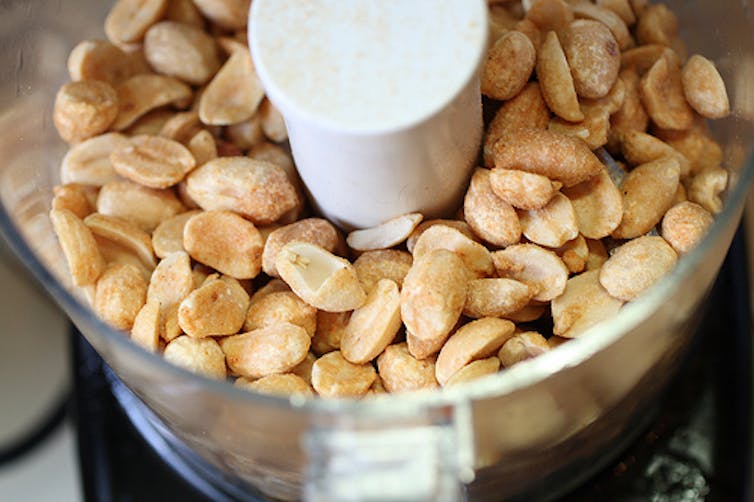Anyone else have the feeling something radical has happened with peanut allergy in the past 30 years? I don’t recall knowing anyone allergic to peanuts or peanut butter as a child in the 1980s, yet today every school is equipped with EpiPens and detailed peanut-response strategies.
And for good reason too. Peanuts are the most common cause of severe allergic reactions to food, including anaphylaxis, the name given to the rapid onset of allergic reactions all through the body including throat swelling, itchy rashes, and wheezing. Anaphylaxis will often result in a trip to hospital; at worst it can be fatal, and the swift onset of symptoms makes it extremely frightening for children and parents.
Global data backs up this inkling that peanut allergy is increasingly common in the current generation of children. Australian research reports a five-fold increase in hospitalisations for anaphylaxis due to food allergy between 1994 and 2005, particularly in very young children.
So peanut allergy is on the rise, and it’s scary. Even worse, we don’t yet know what is causing it. It’s the perfect storm for the creation of a medical myth that eating peanuts while pregnant causes allergies!
Where did the myth start? In 1996, British researchers observed that infants who had not been given peanuts before showed allergic reactions to peanuts on the first ingestion. Therefore, perhaps the maternal consumption of peanuts or peanut products during pregnancy was causing the child’s allergy.
It was just a suggestion, without any evidence as to what mechanism might lead from mum’s peanut ingestion to peanut allergy in the unborn child. However, remarkably, in 1998 the United Kingdom’s Committee on Toxicity of Chemicals in Food (COT) released advice based on this study stating that pregnant or breastfeeding women who have allergies themselves (or with close relatives with allergies) should avoid eating peanuts and peanut products during pregnancy and lactation.
As you can see, it’s a complicated guideline where simple messages are needed. And so it was inevitably shortened, and from 1998 to 2008 while the guideline was in place, around 60% of women, regardless of allergic status, avoided peanuts during pregnancy. First-time mothers were particularly vigilant, being twice as likely as women on second or subsequent pregnancies to avoid peanuts.

In terms of pregnancy myths, this one is not entirely without basis, as there does seem to be some role for maternal transmission of peanut allergy when the mother is allergic to peanuts herself. And while there are one or two studies that support the link between mum’s peanut consumption and increased risk for peanut allergy in the baby, there are far more studies that have found this is not the case and many that have found peanut ingestion during pregnancy can reduce the risk of peanut allergy in the child.
The problem is, it’s complicated. As anyone with peanut allergy can tell you, it is extremely hard to avoid peanuts entirely, so mothers who reported not eating peanuts may have been exposed to peanuts in other foods or even through body creams. Scientific studies in the area use words such as “insidious” and “occult” when describing peanuts, and in my career researching pregnancy risk factors, I can’t recall reading such evocative descriptions before. Such is the sneakiness of the peanut.
Then there’s the question of how many peanuts does a peanut allergy make? And does it matter when they were eaten – early or late in pregnancy? And most importantly, what about genetic links and other factors in the mother’s environment or the child’s postnatal world that might have led to the allergy developing?
We just don’t know the answers to these questions, but there were enough studies refuting the mother’s ingestion of peanuts during pregnancy as the cause of child peanut allergy for the UK guideline to be withdrawn in 2008. Plus, time has shown an increase in the diagnosis of peanut allergy while the guideline was in place and women were avoiding peanuts while pregnant and breastfeeding.
So at this stage, there is no evidence to support the claim that eating peanuts or peanut butter during pregnancy will make your child allergic to peanuts. As a mother, you’ll have plenty of things to feel guilty about, but being the cause your child’s peanut allergy all because you like peanut butter on your toast at breakfast is not one of them.
Should we stay away from peanuts and peanut products anyway while pregnant just to be on the safe side? Probably not, especially given the research suggesting consumption of peanuts might actually build tolerance in the child.
The best advice might be to eat as you would normally, except the foods that Food Standards Australia New Zealand and your doctor recommend you stay away from.
Monique Robinson, Associate Principal Investigator, Telethon Institute for Child Health Research, University of Western Australia
This article was originally published on The Conversation.















